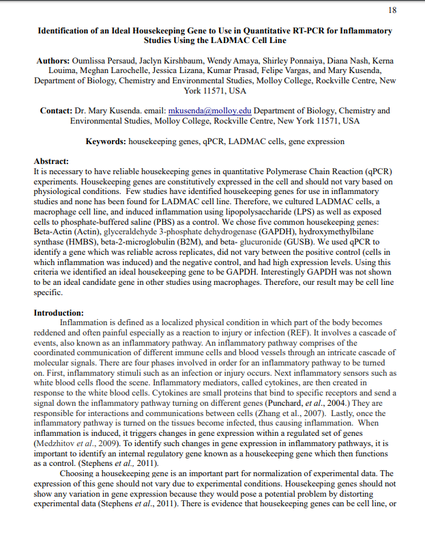
Article
Identification of an Ideal Housekeeping Gene to Use in Quantitative RT-PCR for Inflammatory Studies Using the LADMAC Cell Line
Science and Techonology Undergraduate Research Notes (SATURN) Journal
(2018)
Abstract
It is necessary to have reliable housekeeping genes in quantitative Polymerase Chain Reaction (qPCR) experiments. Housekeeping genes are constitutively expressed in the cell and should not vary based on physiological conditions. Few studies have identified housekeeping genes for use in inflammatory studies and none has been found for LADMAC cell line. Therefore, we cultured LADMAC cells, a macrophage cell line, and induced inflammation using lipopolysaccharide (LPS) as well as exposed cells to phosphate-buffered saline (PBS) as a control. We chose five common housekeeping genes: Beta-Actin (Actin), glyceraldehyde 3-phosphate dehydrogenase (GAPDH), hydroxymethylbilane synthase (HMBS), beta-2-microglobulin (B2M), and beta- glucuronide (GUSB). We used qPCR to identify a gene which was reliable across replicates, did not vary between the positive control (cells in which inflammation was induced) and the negative control, and had high expression levels. Using this criteria we identified an ideal housekeeping gene to be GAPDH. Interestingly GAPDH was not shown to be an ideal candidate gene in other studies using macrophages. Therefore, our result may be cell line specific.
Keywords
- housekeeping genes,
- qPCR,
- LADMAC cells,
- gene expression
Disciplines
Publication Date
February, 2018
Citation Information
Oumlissa Persaud, Jaclyn Kirshbaum, Wendy Amaya, Shirley Ponnaiya, et al.. "Identification of an Ideal Housekeeping Gene to Use in Quantitative RT-PCR for Inflammatory Studies Using the LADMAC Cell Line" Science and Techonology Undergraduate Research Notes (SATURN) Journal Vol. 7 Iss. 1 (2018) p. 18 - 22 ISSN: 2328-3092 Available at: http://works.bepress.com/mary-kusenda/8/